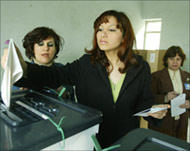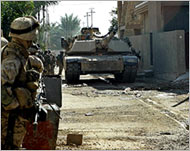Iraqis show mixed response to polls
A number of Mosul’s Kurdish residents have defied death threats and an unstable security situation and headed towards the polls, but in some other Iraqi cities no one is voting.

As polls opened across the country, early signs showed a poor turnout of voters in Mosul. US soldiers were seen driving around city blocks asking why residents were not voting.
Despite a heavy US and Iraqi National Guard presence and no civilian vehicular traffic, six explosions rocked the city. The general hospital had no immediate word on casualties.
Voter turnout was heavy in Al-Qadisiya district of the city, however. A polling station for the city’s Kurdish population is located in the heart of the district.
Sunni turnout negligible
Polling stations in several towns in Iraq have not opened five hours after nationwide voting started on Sunday, the country’s electoral commission said.
|
|
|
Despite a heavy US military force |
“In Latifiya, Mahmudiya and Yusufiya, polling stations have not yet opened their doors,” commission spokesman Farid Ayar told reporters.
“As you know, Latifiya, Mahmudiya and Yusufiya are hotspots. We have allowed residents of these areas to vote in the nearest polling station” to the towns, said another member of the commission.
In war-ravaged Falluja, nearly all residents stayed at home despite the presence of five polling stations. Only one man was reported to have voted.
Meanwhile, the head of the local council in Samarra said no citizens would vote because of the poor security situation.
“Nobody will vote in Samarra because of the security situation,” said Taha Husain, the head of Samarra‘s local governing council.
No employees turned up at polling centres in Samarra and police were not to be seen on the streets, an agency correspondent reported.
Kurdish turnout high
While many voters across Iraq were hesitant to venture outside because of a highly volatile security situation and the promise of major attacks, Kurds in Arbil and other northern Iraqi cities have been rushing to polling stations.
 |
|
Kurds are hoping to strengthen |
Kurdish areas are expected to register the highest turnout in Iraq.
Jalal Talabani, who heads the Patriotic Union of Kurdistan (PUK) and is thought by some to be vying for a top position in the next government, was among the first to vote in Sulaimaniya.
The PUK and the rival Kurdistan Democratic Party of Masud Barzani are running on a common slate which is expected to perform strongly and secure more than 50 seats in the assembly.
Unlike the rest of Iraq, it is not the first time Kurds in the three northern provinces have had the chance to vote in a free election. In 1992, just after the first Gulf war, they elected a regional parliament, and in 1999 they elected three provincial councils.
Political ambitions
But Sunday’s vote is likely to be crucial to the Kurds’ political ambitions as the 275-member national assembly up for grabs is charged with writing a new constitution for post-Saddam Iraq.
Kurdish leaders want that text to enshrine their hard-fought right to self-rule, and want their existing autonomous region expanded to include the northern oil centre of Kirkuk and parts of two other provinces.
Kurds will also pick their provincial councils and their 111-member autonomous parliament.
Iraqi journalist Abd Allah Ghafar contributed to this article
